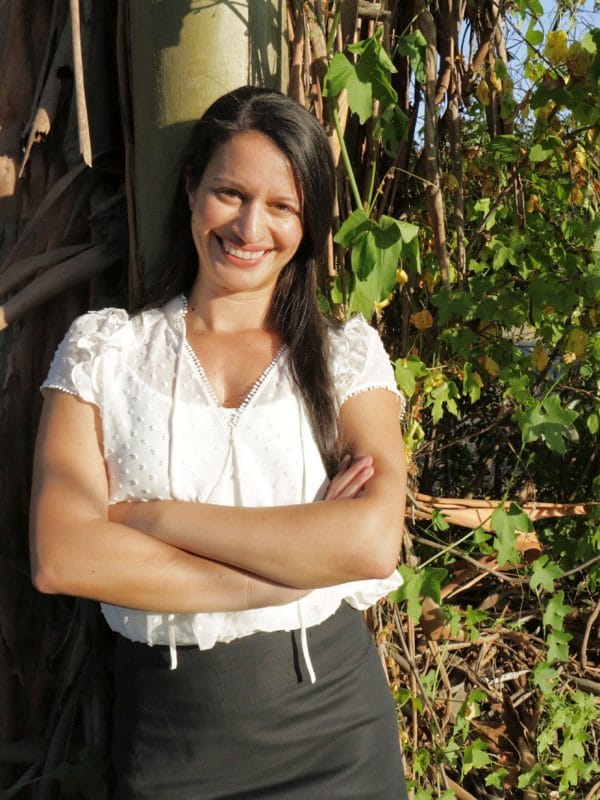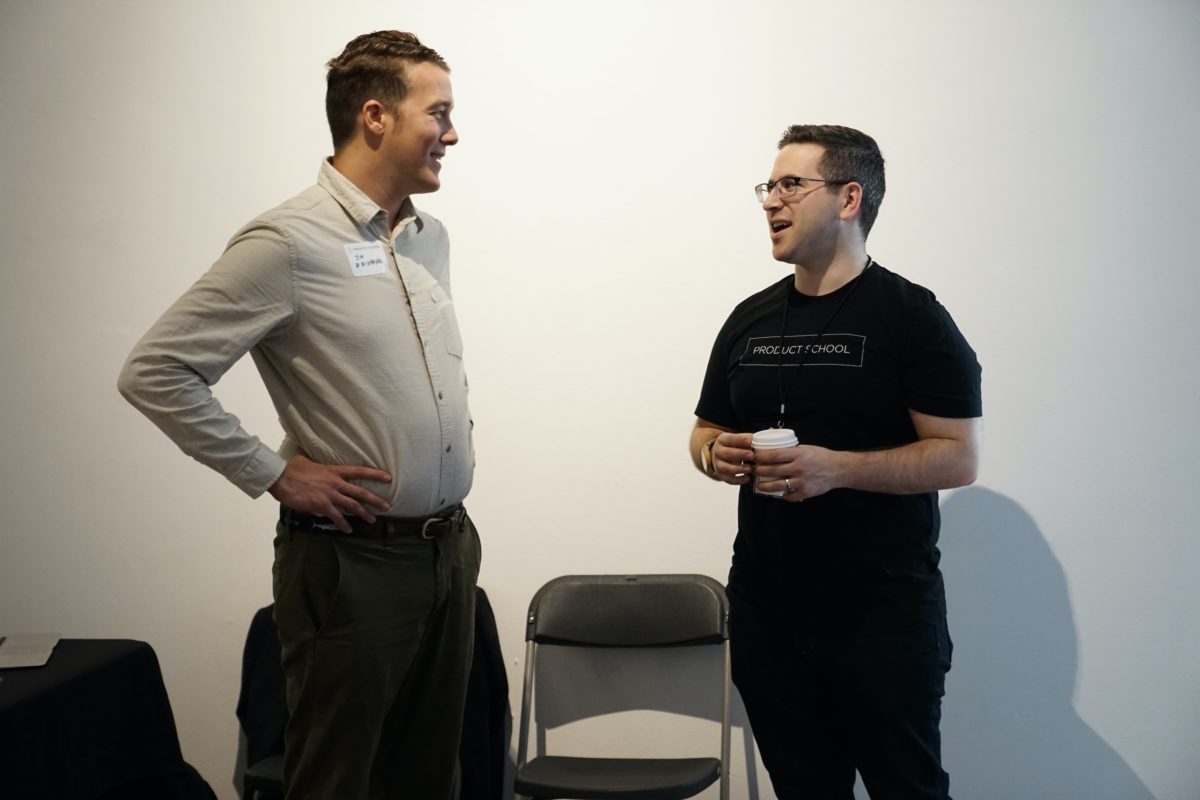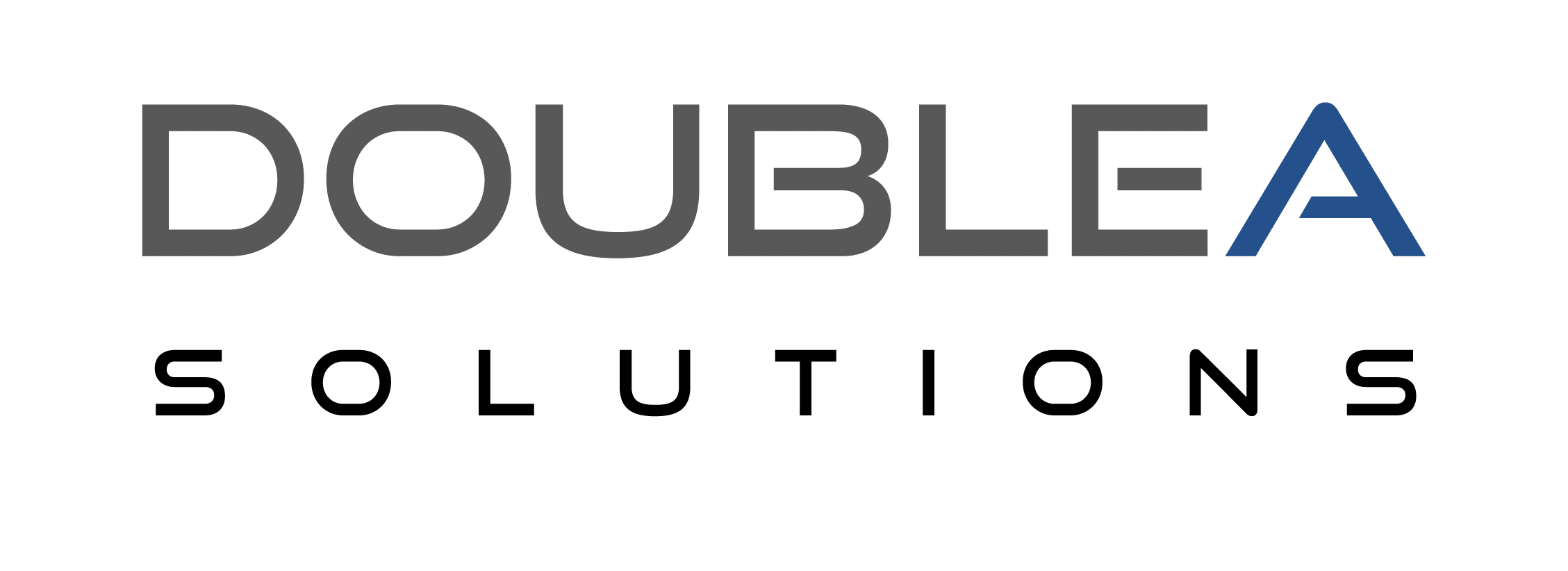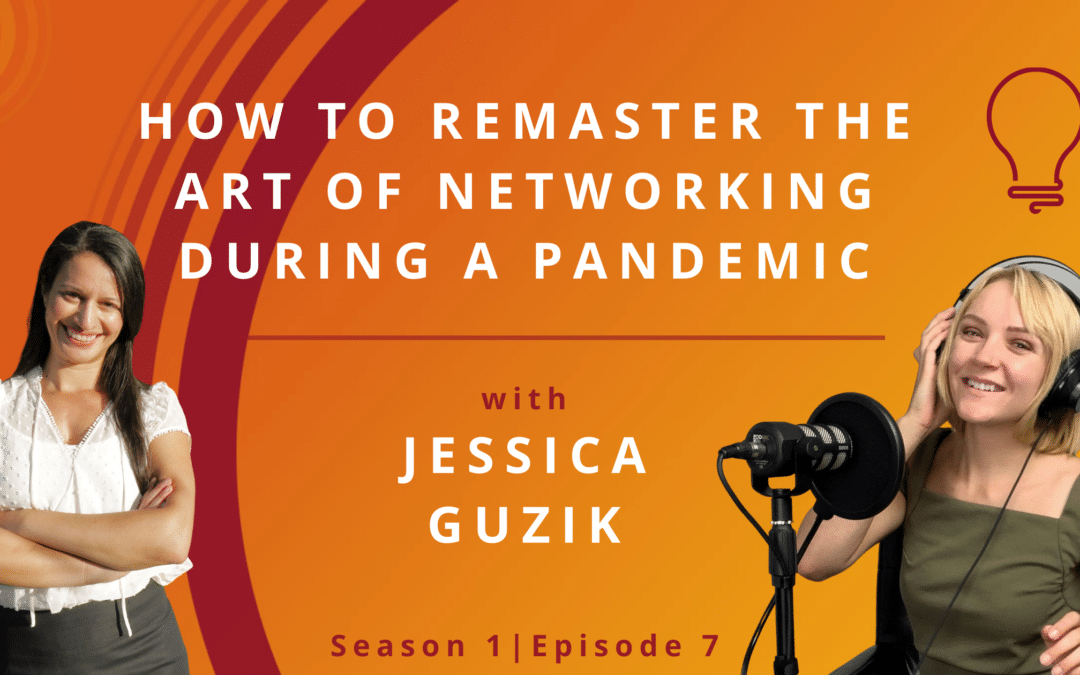Whether you’re new to your field or you’re a seasoned veteran in the business, you know that networking can be instrumental in your career path, but what does it take to remaster the art of networking during the pandemic?
Enjoy Listening To How To Have A Proper Work Life Balance on Everyday Business Solutions?
Click Here To Subscribe On Your Favorite Platform!
About Our Guest:

Jessica Guzik
Jessica Guzik is a corporate strategist, working with a few well-known brands over the years. Like some of though, Jessica considers herself introverted and the idea of networking would scare her. However, with experience, she’s realized that the art of networking lies in the strength of the connections and not necessarily the numbers.
Jessica is also a podcast host herself for the show The Art of Speaking Up. She is well versed in speaking about professional development and how to adopt who you are to your career.
Episode Transcript:
Halie Morris 0:19
Hello everyone, and welcome to Everyday Business Solutions. My name is Halie Morris. I am your podcast coordinator and host. Today we have Jessica. Jessica is going to go ahead and jump in. She’s going to tell us a bit about herself and what she does. Our topic today, which is how to remaster the art of networking and the ever-changing art of connections and relationships? So Jessica, if you don’t mind…
Jessica Guzik 0:58
Thank you for having me. My name is Jessica and I’m a corporate strategist. That’s what I’ve been doing for pretty much all of my 9 to 5 career. On the side, I host a podcast for professional women. It’s called The Art of Speaking Up and it’s about professional development and feeling confident at work. That’s pretty much what I do.
Halie 1:21
Alright, great. So Jessica, obviously, being a corporate strategist and having been around the block a couple of times, she knows our topic pretty well. We’re going to start by really just diving into what networking actually is. We all have our own perceptions, but maybe it’s not quite you what you think.
So Jessica, can you help us put a good definition of it?
Jessica 1:46
Definitely. So the idea of networking used to really freak me out and was this daunting thing where I felt like I had to talk to strangers and be really polished and be really impressive to them. It was something that I wasn’t interested in and felt stressed out about. I felt like I had to do to have a successful career but didn’t want to do it.
What I realized over time, and it’ll be interesting to get your thoughts on this perspective too, is that networking, it goes so far beyond meeting people and going to a networking event, and business cards. It’s not about any of that stuff. For me at least.
It’s really about building deep, trusted relationships within your professional life. Some of the most powerful relationships in my “network” aren’t ones where I went to a networking event and met someone. They are ones where I have a personal relationship with that person and I’ve worked with them, and they know me really well.
So for me, it’s really been about depth and longevity. As an introvert, that really appealed to me much more than what I used to think networking was about.
Halie 2:52
Wow, it’s very interesting that we have two introverts doing this right now and we’re both podcast hosts. So the world is not quite what you think it is, I guess.
Jessica 3:02
A lot of podcasters are introverts.
Halie 3:05
I picked the right area then. I thought I wouldn’t be able to do it because I do tend to be more introverted. People don’t think I am when they meet me, because I talk a lot. It’s nervous talking, but I talk a lot, and I get excited to meet people, I love people, but I also get very socially exhausted very quickly.
I would agree, though, with the networking, that the most valuable connections in my network and really the only ones I can pull on are those ones I have some kind of relationship I built with them. So for my academic fraternity, it was those ones that we hung out, we sat by each other meeting, or we would go to the bar after meeting and just kind of chat and catch up.
We’d network also with somebody from the “rival academic fraternity” and we would end up spending our Halloween night with an entire group of them. Or with professors, I’ve had in college and staying after class or in between projects, and you’re just talking to them, catching up, going to their office and then you need a little help? Oh, they have a suggestion, or they have something that might interest you profession-wise.
I have the same thing with people I work with now. I love to connect to people in the office and some people I connect more strongly with, but when it came to-
I was doing talent acquisition and I had just graduated, wanting to go full time. We didn’t have demand with our recruitment for another full-time or even really for the two of us that were there. Okay, what do we do with you? They literally made a position around their needs and my skill set. That’s why we have a podcast today.
Jessica 4:56
Oh, that’s awesome! Yeah, it’s interesting. I think the old inaccurate definition of networking that I had was you have to go find people. You have to go out there, which maybe works for some people, but it feels a little daunting to me. I think, for me and it sounds like a little bit of what you are saying, it’s more just about being open.
So I’m not necessarily out there chasing people and trying to meet people, but when I’m in the kitchen at work during non-COVID times, instead of avoiding eye contact, saying “hello” to someone. Just when you have that openness all the time, you never know when there’s going to be some sort of connection, and then things happen on their own.
You don’t have to be aggressively going to networking events, or adding people on LinkedIn, or- I’m trying to think of all the different misconceptions, but I think it’s more about being open, showing a little bit of your personality.
Then you find the people, like you said, who you naturally gravitate towards, and then you can network with those people. You don’t have to force-feed yourself the people who you don’t naturally feel connected to.
Halie 6:03
Yeah, because I think there’s that idea too that the more people and the more industries and more jobs, the better. But if it’s an awkward relationship and they need somebody to fill this position or they want to recommend someone for a job or if they want to go golfing with on a Saturday and talk business slash personal- If it’s an awkward relationship, you’re going to be the last person they think of.
Jessica 6:27
Definitely! Also, the thing about networking is it’s not like you’re trying to network with everyone. The whole point of it is finding your specific people. So it should, to a certain extent, feel good, whether you really click with that person personally, or maybe what they do is so interesting to you that you feel compelled to get to know them and learn more about them.
If we can’t possibly network with everyone, we might as well narrow in on the places where we have a genuine interest. So it doesn’t feel like we’re slogging through the mud and it’s so painful and horrible.
Halie 7:03
That’s what you bring to your office too, isn’t it? If you have a connection within a niche, and you have that strong relationship, and you come into an office, whether you’re marketing, sales, support, engineer, whatever you’re doing in that office, there are so many different kinds of positions.
What makes an office great is diversity. It’s not that every person has a million different connections that are from all over. It’s that each person brings their own unique experience, their own unique network. That’s how it actually grows.
So when people are talking and say, “I have to know all these people to market to them. I know all these people to sell to them.” It’s that affinity over awareness. Awareness is like “I kind of recognize their face” and it’s passing. But affinity is that deeper connection, that understanding, that brand awareness that we strive for, and it’s there on a personal level, too.

Jessica 7:57
I agree. I think sometimes the affinity gets built just by really caring about the work that you do. When you really care about the work that you do, I think what happens with all the people you work with, is that you pivot into a mindset of serving them and partnering with them.
I think people can feel that, and people appreciate that. It’s when you do that consistently over time, then they want to call on you to support you as well. This also speaks to being in a position and a field that you like, because when you like it, you’re naturally happy, you’re going to show up that way.
So it kind of creates this spiral effect of you showing up really well. Then people are going to want to support you and help you reach your goals.
Halie 8:42
Thinking about what I do, when I get excited people are like, “Oh, your eyes lit up.” and I’m like, “Oh, I didn’t even notice. I was just doing my talking thing again. You can tell me to shut up at any point.” But they get excited anyway.
It’s a subject maybe they don’t care about at all. If I’m getting into talking about the podcast, or I’m getting into talking about fashion history and social trends and things like that as far as how we behave. I start talking about it, and they’re like, I didn’t care about the subject, but that’s really interesting.
Jessica 9:19
I think joy is contagious and I think that people in an office setting are craving joy. I think that they’re craving authenticity. So when you are genuinely enjoying something and genuinely feeling happy, people are drawn to you.
I think that’s so important because we can get so caught up in the day-to-day and the monotony, we leave sometimes all of the interesting parts of our personalities at the door when we enter into our jobs. It’s so powerful to just come in with a little bit of extra enthusiasm, just a little bit of extra energy, extra positivity.
Halie 9:57
Yeah, because your network starts with who’s immediately around you. If you can’t connect to them, you’re not going to connect outside of that. But with joy- it’s any of our personality traits, our attitude, the way we carry yourself, the air we put off, it’s so contagious.
So you get back what you put out. If you’re putting out brooding, bored, that trudging through the workday attitude, the people around you are going to feel it, and they’re going to give it right back. It’s going to come at you tenfold.
You’re not ready to be there so the day is not going to be ready for you. But it’s like you said, if you’re putting out happiness and things like that, people feed off of it and they give it back.
Jessica 10:39
It has to be genuine. You don’t want to be forcing yourself, but I think once you remind yourself “what do I like about my job? What do I really enjoy about this,” usually, unless you’re in a situation that you really don’t like, there are usually things about it that you feel really lucky to have and that feel really special sometimes.
If I’m in a funk about my job, I think back to when I interviewed for it, and I really wanted it. I think about the moments of being finished with the interview and wondering “Am I going to get this position?” and I try to remind myself that I was so excited about this.
Then that helps me see and get out of the day-to-day stresses that can sometimes make you forget why you chose to be there in the first place.
Halie 11:25
I would agree because, for me, I like to pick up the little things I’m trying to teach my younger siblings. You have to choose to be happy, but it’s not something that somebody can define, explain, or teach you. It’s literally an internal decision to be content with the day, the things that actually make you happy.
So I like lunchtime. I like talking with coworkers. I can’t do it all the time, though some people might think I do because part of my job is just talking. You can’t do what you like all the time.
So you have to learn that when you get that energy boost from doing something you like, whether it’s just saying “Hello, how are you?” and catching up for two seconds to carry it. Then that makes it genuine versus being like, “I hate my job, but I have to be happy for the phone call.”
Jessica 12:21
Oh my gosh, yes. Sometimes you have to put on a face. You gotta do what you gotta do, but I do think that when you genuinely are caring and engaged, people really feel it and it makes them want to work with you. It makes them want to help you.
I think we really underestimate the power of mood and energy. We just focus on work and outputs. We forget that we’re all human, and that we all just want to feel happy and content and that you can make that happen for other people simply by the way you show up.
Halie 12:52
It’s so important. As I said, you’re gonna come in with bad days. I feel like we all have them. There are just some things in life, you can’t counterbalance by being happy or it’s a little harder to find happiness, especially with COVID-19. There’s been a lot of people who have been knocked down.
So it’s being able to sometimes just set it off your shoulders for a couple of moments, and realize that it’s okay to actually let yourself not worry and let yourself enjoy a second, even though it’s hard and you have to do something about it soon or you have to figure something out. It doesn’t mean that it has to be every second of your day. It could be an hour of your day, it could be two hours of your day if it’s really a big issue, but you are allowed to enjoy your day too.
Jessica 13:44
I think when difficult things are happening. Sometimes I know for me, it just takes over. Sometimes there’s just a period of time where I’m in it and that’s okay, too. Whenever you’re in it, it feels like it’s gonna last forever. It’s so hard to remember and imagine how it’s gonna feel when it passes, and then it passes then you’re fine. Then something happens again.
Halie 14:06
I have a friend and she and her boyfriend are going through a difficult time right now. Not in their relationship, but he’s handling something that’s very hard and she cares about him a lot. It means that right now with the situation, she’s not able to get attention from him. They only get to spend so many hours a week together. They’re not able to have that time they usually do.
She felt bad for being upset about it. We had to tell her that you’re allowed to be upset because sometimes even allowing yourself to fully feel those emotions helps you move on to the next part more easily. It’s not like that you should feel guilty for getting over something or seeking your own happiness in bad situations.

So it’s a very interesting life but coming back to the networking aspect, in particular, it’s so important to meet your emotions at a good level and meet them head-on, learn how to cope with them throughout the day.
Because again, what you put out is what you get in. If you’re putting out negativity, if you’re putting out these bad emotions, they’re going to come back at you. It tends to mean that if you are building a network, or you are building relationships, they’re not going to necessarily be the most positive for you.
You want to find your niche, but you want to find the niche that builds you within your network.
Jessica 15:35
That’s true. I think it’s contagious. I also think we are gonna be at our jobs no matter what, so why not enjoy it? Why not make it something positive? I think when you get into a bad headspace and it makes the day longer. It doesn’t really help you feel better.
So I think it’s really helpful to recognize it. Sometimes it’s about changing jobs, right? If a job isn’t working, you can change it. But if that’s not the solution, why not just show up as best you can? Why not have it be as enjoyable as it possibly can be?
Halie 16:11
You might get to the point where you’re like, “Oh, my mindset was the only thing holding me back. I might not like the task I’m doing, but I really like this office, or maybe it’s not quite my personality, but I actually can just lose myself in the task, and I can connect to people anyways.”
Then you find yourself there for a couple of years because you actually don’t mind or you actually really want to come to work most days.
Jessica 16:36
There’s usually something you can find. I also think with the things that you don’t enjoy, that’s really helpful data to start thinking about future roles and the rest of your career. What are my non-negotiables that I really need to have in place to feel happy and satisfied in a job? Then what are the things that I prefer to have, but they’re not necessarily deal breakers?
I think it’s really important to be discerning, especially if you’re making a job change. There’s so much effort in interviewing and landing a role. So why not be really clear and specific about exactly what is going to make you happy because there are so many positions out there. You are likely to find something if you stay in the search and you stay committed.
Halie 17:17
Then you’re interviewing the business for the job. You’re seeing if it’s a fit for you, as well. Ultimately, if you make sure it’s a fit and it’s a two-way interview, then you’re more likely to get into that job and be satisfied with it. Because you did your due diligence and then coming back around, you can expand your network at the new job by connecting on a deeper level with the people you work with.
Jessica 17:44
Totally true for me. When I’m interviewing I feel like my spidey sense is so important. It’s not super scientific, but I just try to really sense “what am I feeling in this place? What kind of vibe Am I getting?” And it’s been really accurate so far.
Halie 18:02
I walked into this office and I was like, “I like this.” (Most people are still remote due to COVID-19, but at the time we had a full office). I was looking at two different jobs. My dad was pushing me towards one job because it was a bigger company that had been around longer. He knew its name and he was more comfortable with me being in that setting because he thought it’d be more stable.
But I walked in here and I was like, “No, I want to be here. This is the office I want to be in. I don’t care what I do. I just think these people are cool.” I was still very introverted about the whole thing because then I talked to so many people.
I wondered, “Oh my goodness, what if they don’t like me?” That social fear or whatever, when I interact with people I have it every time but I still enjoyed those interactions. I still wanted to be here and my spidey sense was like, “Yes, go for it!” It worked out both ways.
Jessica 18:58
I’m so glad that it worked out for you. Its sort of like a workplace has its own personality and you can almost feel the collective energy when you’re there. For me, it’s the same. That impression that I got right at the beginning usually turns out to be right.
Halie 19:14
Yeah, and usually if you are feeling that, and it’s reflected in how you’re carrying yourself, even if you’re nervous, or you don’t answer the questions perfectly, it’s going to move you up to their priority list. They’re going to know that she connected or he connected and they’re going to consider you when it comes time to make the final decisions.
Jessica 19:35
Oh yeah, I totally agree!
Halie 19:39
Going off of what we talked about with networking, with building these connections. with staying true to ourselves- how would you say it shifted? Because, obviously, we’ve seen trends throughout time for a while. Even in sales and marketing it was just going out and talk to people and your priority is making a sale or making them interested, even if it was brief.
So how would you say that, between how we networked before, that old definition of networking or that old idea of what it was- how would you say it has shifted with current history, even with the current situation?
Jessica Guzik 20:19
Yeah, I think we probably have to put in more effort than we used to. Even in day-to-day work, I’m feeling this. We don’t have- depending on what our work situation is, but if we’re in a remote situation, you don’t have those hallway interactions. You’re not having those impromptu conversations with people and I think that really changes things because that is where a lot of those bonds get formed. It is those unscheduled moments of time.
So I think, right now, it’s really important to think about manufacturing those and how those can be created. I have two team meetings every week instead of one and during the second one, we don’t talk about our projects. We talk about other things and that helps us feel connected.
It’s stuff like that, where you’re just thinking about, “okay, how can I feel connected to this person beyond the four meetings that I am showing up in with that person.” I think also, we have to drop the story that we’re bothering people, that people don’t have time for us, that we’re asking too much to get on someone’s calendar.
It’s so funny because as my title has grown, I’m sort of a non-hierarchical person. I think of everyone similarly, treat everyone similarly, and I don’t see myself within the hierarchy. But I just noticed that people- The other day I was like, “Why are people so scared to get on my calendar? Why are people so excessively grateful, and so apologetic every time they schedule time,” and I realized, like, Oh, they think I’m so busy, and I don’t have time for them.
But I do and I love meeting with them. So I think, not everyone’s generous with their time, but it’s always good to assume that everyone is, and just be proactive about connecting with the people that you want to connect to. Maybe, once in a while, someone will turn you down and it’ll feel crappy for a minute or two, or it’ll feel bad for a minute or two. Then you’ll move on to the next one and you’ll be okay.
I think it’s important not to be afraid to reach out to people and not to be afraid to bug people a little bit. Because that’s also how those connections are going to get maintained right now.
Halie 22:28
Especially because some people are like me. When I send out a link to put their event on my calendar, I’m always like, “I’ll go by your time.” That’s my big thing. When you have availability, we’ll make it work. My schedule is way more open than you think. So, if they’re in-person locally, we can go meet for lunch or something. If they’re not, we can do a Zoom call, or we can do a phone call.
A good amount of people, once I added a Zoom where they could pick that option, will pick that option. I’m always kind of like, I can’t believe you picked a phone call when somebody does. I want to see your face. But they’re more comfortable with it.
They like that connection, and you tend to spend more time on the call, or when it’s just a Zoom call, it tends to be a conversation that leads into what we’re trying to get to, the business part of it may be small but you come out and you’re smiling. Oh, I really liked talking to that person. Did you know- Blah, blah, blah?
Half the time you learn something. So I tried to bring it back to the phone call so that they’re still getting that same value out of it, even if they didn’t think they were coming in for that kind of value.
Jessica 23:49
I like what you said, it’s the non-business part of the conversation that is so important. I think we always forget that we’re always so focused on like, what do I need? What am I working on? And it’s that softer element that I think is really at the heart of networking.
Halie 24:05
Yeah, because people want to know what you do business in and I feel like they don’t want to know until they know you. It’s the same thing where people don’t want to buy from a brand until they know the brand these days.
That’s something that shifted over time too. It used to be that you shop around to find the best deal, the best quality, and now you find a brand that follows the principles and things that you uphold.
Then you might spend more for that product, but you tend to love the product more, partly just because of who makes it but also because you feel confident in how they made it or what they’re doing with that, whether it’s SaaS or it’s a retail product or anything in between.
Jessica 24:46
We want to feel connected to it.
Halie 24:50
That’s the content marketing idea. It’s that people want to feel somebody (a personality and connection) through what they’re actually putting out. A lot of companies are gaining popularity because their commercials are funny and engaging. There’s this kind of theme where Coca-Cola is relationship building through gatherings and stuff like that, which is, obviously we’ve gone a little quiet on that recently.
But they did the names on the bottles, and then all the commercials were in line with that. Ours is how to be more efficient. So we’re really working on ways to show people that by gaining efficiency and the things they do with us, they’ll have more time for them, have more time for getting important things done at the office, but also getting out a little bit early, or maybe not working as many overtime hours, if at all.
It comes back to your brand, or that person that you just met because you went out to lunch versus shaking hands at a conference or something.
Jessica 25:52
Definitely. I think the bar is higher. People expect more and so brands are having to show their soul and their personality so that people feel connected. Because otherwise we tune things out, and we’re so trained to tune out ads as much as we possibly can. So I think that’s part of it, too.
Halie 26:13
The new thing with YouTube ads that come in the middle of the video. For the business side, they’re like, “Oh, that’s a good idea!” but I say don’t do it. It instills deep, ugly emotions in the water.
Jessica 26:24
Oh my gosh! When you can skip- It’s such a bad feeling when you’ve gotten used to skipping it and then you’re forced to watch like a whole minute! It feels like forever.
Halie 26:33
I think I started a video once and it was like you can skip after the five seconds or whatever it is, but it was like a 15 to a 20-minute ad and I watched it all the way to the end.
I got to the end and I was like, “This isn’t what I came for.” But I liked it. It was engaging and it caught my interest in five seconds. I kept going. I had the option to tune out whenever I was ready, but you have to realize sometimes somebody’s already connecting to a video with those ads. So if you interrupt the middle of it, they’re going to be a little salty and they might project those feelings onto your brand.
Jessica 27:09
Yes.
Halie 27:11
It’s the same thing though, because of our personal brand, when we network, when you first meet somebody, what we try to bring as a genuine person, if you’re just cutting into things that they already value by saying, “Oh, hey, like blah, blah,” it’s not gonna be so much like you’re inserting yourself on their schedule.
It’s maybe that you’re disrupting their day, because they’re having a really good day, and you come in and you’re just very aggressive about wanting to meet them. Then they’re like, “Oh, okay….”
Jessica 27:41
It has to be natural. There has to be an organic element to it, which I’m not saying don’t reach out and invite someone to a coffee, but the more organic you can make that the better. Do you have something in common with them? I think when it comes out of nowhere, sometimes it can feel surprising.
But that being said, I’ve had random people message me on LinkedIn and ask if they could do a quick coffee. If I have time, then I say yes. So I think it’s always worth trying just to be respectful and be grateful ahead of time.

Halie 28:11
I would agree. There’s a little bit of an art to it, but the art’s going to be different for everybody because every person is different. How you connect to people is going to be different.
But that comes back to connecting to people building a relationship with people not just shaking their hands or whatever.
I think we all have that moment, probably a few times now that we’re able to see people face-to-face when you’re like, “Okay, I want to shake your hand now, but we can’t” (because of COVID-19). So you just stare at each other with that look. Or you’re both huggers and you’re like “I just want to give you a hug.” And yours. Over the edge of your mask, you’re like giving each other the look, and you just kind of stand there for a moment.
It’s awkward, but oddly, that’s part of the relationship you just built as you both bond over this handling of the situation together and having that little thing in common.
Jessica 29:06
Oh my gosh, yes! I think so much bonding is happening over Coronavirus. I was just thinking about it the other day. It’s so crazy that everyone in the world is dealing with this all at once. It’s just like, wow! I don’t know if there have been things in my life that have been on this scale that way,
Halie 29:24
I think even people mentioned the recession. Oh, wait, because that was so big, but back in ‘08, I was still with my biological mom. We were poor. So everything was poor to start with. Nothing changed for us really, but some people did well, again. There are some businesses that actually did better. Then there’s some that were dramatically impacted in the other way.
But it’s never been like this, where we literally knocked the entire world sideways with this stuff. I talked to people in Hong Kong about it. It was like, what’s your guys’ rules about wearing a mask? And in Hong Kong, it’s a $5,000 fine and like three months in jail or something if you get caught without it.
I said, “we don’t do that,” and she’s like, “and your neighbors will rat you out,” but people wear it much more frequently there. It was part of the culture ahead of time. That was a conversation I never thought I’d have.
Jessica 30:22
Wow!
Halie 30:24
So talking to people on the other side of the world, and you’re both handling the same situation, maybe just differently, but you’re both seeing the same crazy virus and its impacts.
Jessica 30:36
Yeah, it’s so fascinating.
Halie 30:40
All right. I think we are at a really good point to start to close this out. We’ve given people a lot of food for thought. Did you have any other advice or things that you would like to mention before we close out?
Jessica 30:55
I would just tell people to be brave when they’re networking. I think we all want to be super confident all the time, but I would just say to someone listening who feels like they shouldn’t network, or they don’t have the personality for it, that’s not true.
We are all capable of building human connections and we’re also all capable of pushing ourselves outside our comfort zones. So if someone does feel a little bit afraid, or a little bit intimidated, that’s totally normal. I think it’s an invitation to just lean in closer to your edge and grow.
Halie 31:30
Some people will bond with you over that nervousness too.
Jessica 31:34
Exactly. We all feel it in some situation or another.
Halie 31:39
I would agree. All right. Well, thank you for coming on, Jessica. We are going to go ahead and wrap up right here.
Give us a follow and don’t forget to review because as much as I love getting input from wonderful people like Jessica, I love to get yours as well. Thank you everyone and have a good day!

